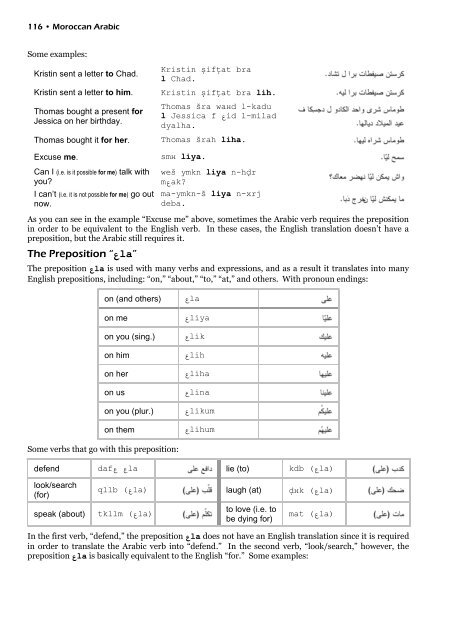Moroccan Arabic textbook 2011
Moroccan Arabic textbook 2011
Moroccan Arabic textbook 2011
You also want an ePaper? Increase the reach of your titles
YUMPU automatically turns print PDFs into web optimized ePapers that Google loves.
116 • <strong>Moroccan</strong> <strong>Arabic</strong><br />
Some examples:<br />
Kristin sent a letter to Chad.<br />
Kristin sent a letter to him.<br />
Thomas bought a present for<br />
Jessica on her birthday.<br />
Thomas bought it for her.<br />
Excuse me.<br />
Can I (i.e. is it possible for me) talk with<br />
you<br />
I can‟t (i.e. it is not possible for me) go out<br />
now.<br />
Kristin sịftạt bra<br />
l Chad.<br />
Kristin sịftạt bra lih.<br />
Thomas šra waнd l-kadu<br />
l Jessica f idع l-milad<br />
dyalha.<br />
Thomas šrah liha.<br />
smн liya.<br />
weš ymkn liya n-hdṛ<br />
mعak<br />
ma-ymkn-š liya n-xrj<br />
deba.<br />
As you can see in the example ―Excuse me‖ above, sometimes the <strong>Arabic</strong> verb requires the preposition<br />
in order to be equivalent to the English verb. In these cases, the English translation doesn‘t have a<br />
preposition, but the <strong>Arabic</strong> still requires it.<br />
The Preposition ”laع“<br />
The preposition laع is used with many verbs and expressions, and as a result it translates into many<br />
English prepositions, including: ―on,‖ ―about,‖ ―to,‖ ―at,‖ and others. With pronoun endings:<br />
on (and others)<br />
on me<br />
on you (sing.)<br />
on him<br />
on her<br />
on us<br />
on you (plur.)<br />
on them<br />
laع<br />
liyaع<br />
likع<br />
lihع<br />
lihaع<br />
linaع<br />
likumع<br />
lihumع<br />
Some verbs that go with this preposition:<br />
defend عdaf laع lie (to) kdb (laع)<br />
look/search<br />
(for)<br />
qllb (laع) laugh (at) ḍнk (laع)<br />
speak (about)<br />
tkllm (laع)<br />
to love (i.e. to<br />
be dying for)<br />
mat (laع)<br />
In the first verb, ―defend,‖ the preposition laع does not have an English translation since it is required<br />
in order to translate the <strong>Arabic</strong> verb into ―defend.‖ In the second verb, ―look/search,‖ however, the<br />
preposition laع is basically equivalent to the English ―for.‖ Some examples:


